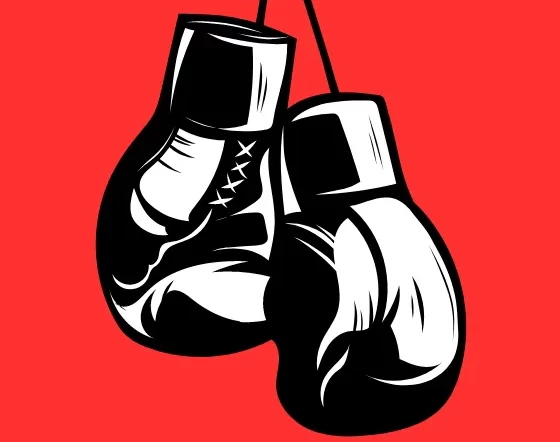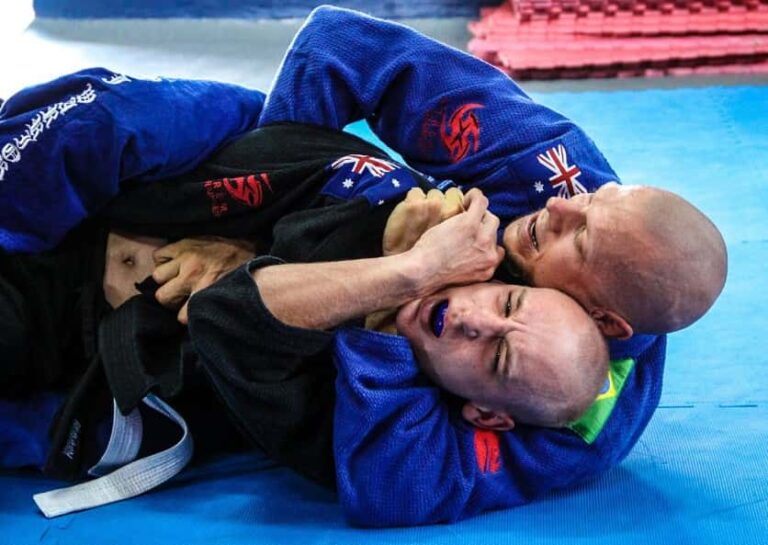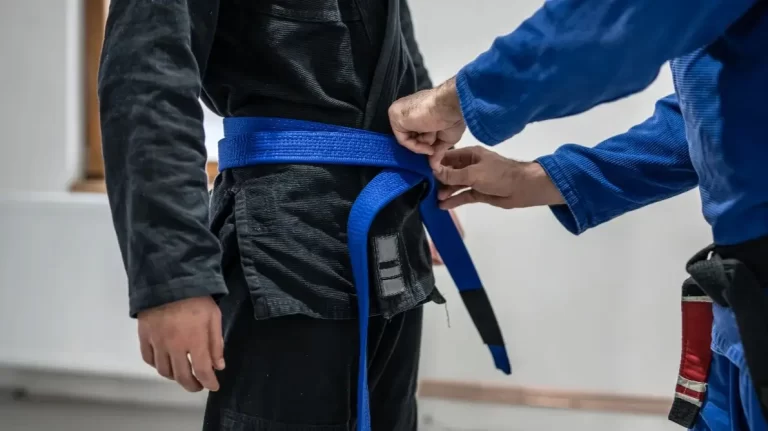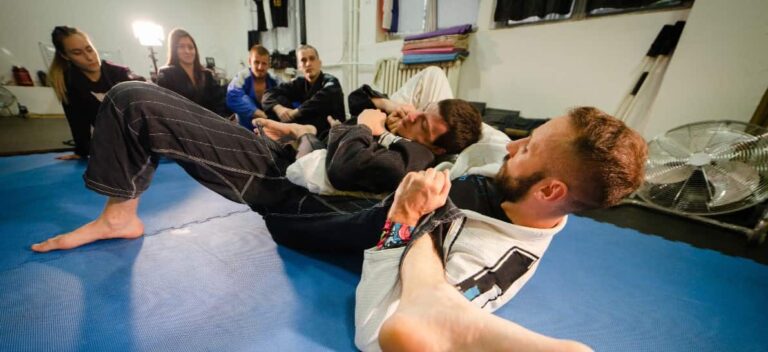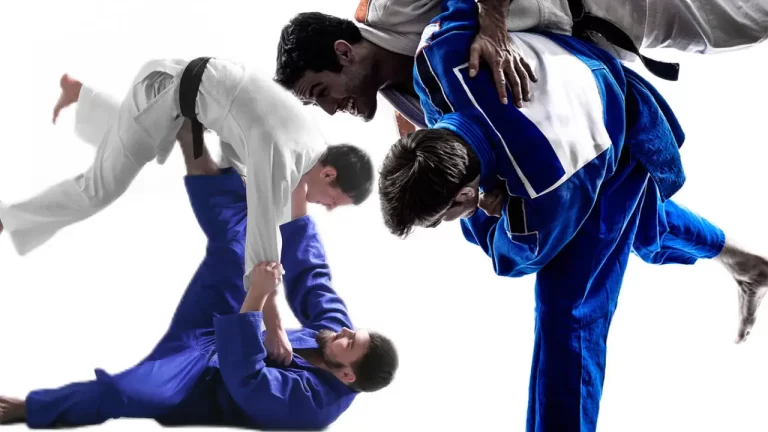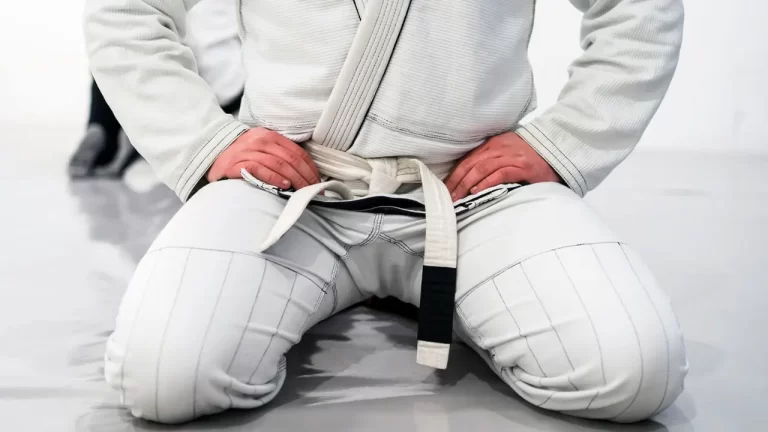Karate versus Jiu-Jitsu: Why BJJ is superior
Brazilian Jiu-Jitsu people, you know the drill…whenever you mention you’re into Jiu-Jitsu, people start imagining you’re mastering karate moves instead.
But Karate and Jiu-Jitsu are two totally different martial arts doing their own thing.
Each has its own bag of tricks, and they don’t share any of them. Karate and Jiu-Jitsu are like night and day.
Don’t get me wrong, karate has its moments, but it’s like comparing apples and oranges with BJJ. Brazilian Jiu-Jitsu brings something to the table that karate just can’t match.
I will tell you exactly why Karate and Jiu-Jitsu aren’t the same, and why BJJ reigns supreme. So, if you’re thinking about diving into karate, just don’t.
It is ok for kids, but that’s about it these days.
BJJ offers techniques that are far more practical, and effective in real-life scenarios.
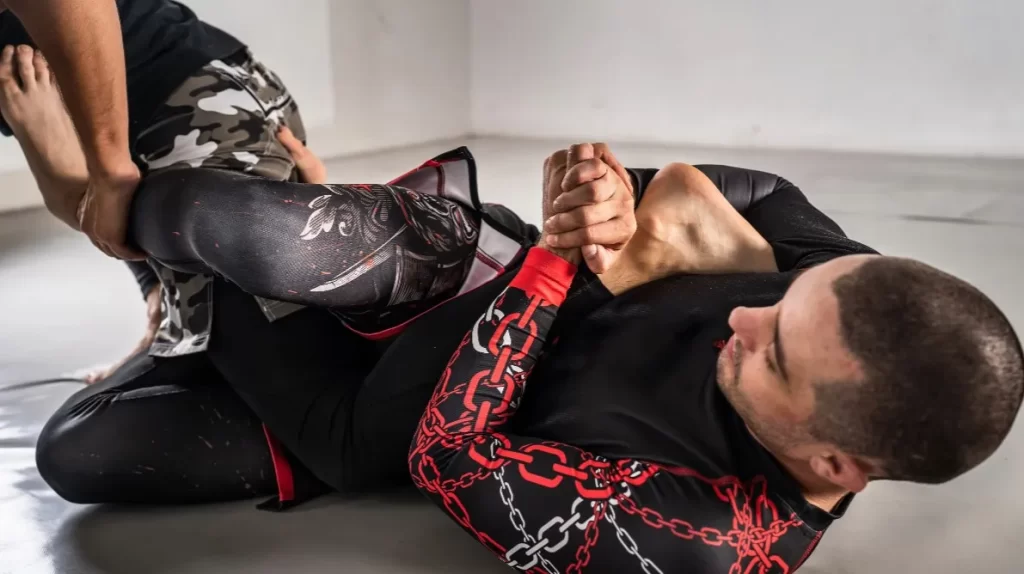
Table Of Contents:
- The focus of karate
- Why Karate sucks
- Why Brazilian Jiu Jitsu is better
- Karate vs Jiu-Jitsu for self defense
- Factors to consider
- Which is better for street fights
- BJJ vs Karate for MMA
- BJJ belt rankings
- Karate styles & belt rankings
- Frequently Asked Questions
The focus of Karate

Karate focuses on quick movements to land strikes. But here’s the catch, it’s not the whole package when it comes to striking. It’s like trying to start a car without an engine.
This happened because Karate wanted to be more friendly for the younger crowd to sell memberships and classes.
Modern-day Karate doesn’t really go all out with full-contact sparring. It’s more like a choreographed dance than an actual fight.
So, when we talk about karate versus Jiu-Jitsu, if you’re looking for a taste of the real deal, you might want to consider other options for martial arts training.
Why Karate sucks versus Jiu-Jitsu

Karate is all about throwing punches and kicks, but it is a painfully hard martial art to watch these days.
I watched my friend compete once, and he showed me his Karate training, expecting to blow my mind…
I tried to be cool about it, but honestly, some of those moves are just… uhh, let’s say “interesting.” Like those “katas” where you’re fighting invisible enemies? Yeah, cringey.
Calling the versions of Karate taught today a martial art feels like a stretch to me.
With the rise of the UFC, we’ve seen what really works in the ring, and some martial arts are just puffing themselves up, if you catch my drift.
Karate has kind of fallen from its glory days. I mean, I was a white belt in BJJ, and I was taking on Karate black belts like it was a walk in the park.
These were full-contact fights, 4 in total, and striking was allowed. This was only minutes apart, as I wanted to test BJJ out against karate.
It took me less than 30 seconds to finish each of them.
No sweat. Easy.
Now, don’t think I’m bragging here. I’m just saying, that it’s clear as day that Karate as a martial art might be a bit outdated compared to Brazilian Jiu-Jitsu and the other cool kids on the block.
Times have changed due to the rise of MMA my friends.
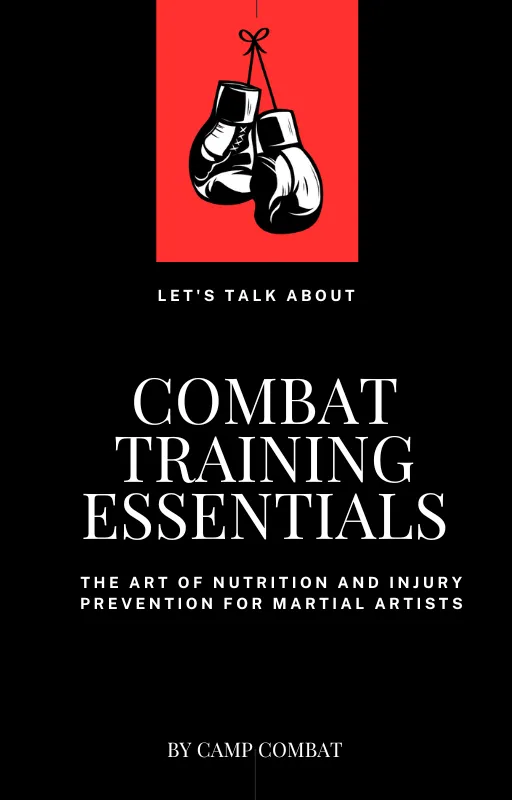
- Master Your Nutrition
- Get Phenomenal Conditioning
- Get an Injury prevention Strategy
Get the tools you need to optimize your performance on the mat and unleash your full potential.
Why Brazilian Jiu-Jitsu is better

in comparing these two martial arts, BJJ is like a puzzle where you’re trying to find the right pieces to shut down your opponents advancements to get to a dominant position yourself.
If you haven’t grappled before, you will quite literally feel like a fish out of water, flapping its gills to try and get air.
The ground attacks and takedowns in BJJ will force your opponents into submission.
Brazilian Jiu-Jitsu focuses on taking down an opponent to the ground to gain an advantage through ground fighting skills.
Whilst using BJJ techniques you will easily be able to strike your opponents whilst also having full control over them, and not getting hit yourself.
It’s the ultimate form of domination, and the safest way to win a fight too boot as YOU can choose how far things go, YOU can choose the intensity at which things get escalated to.
Brazilian Jiu-Jitsu proved itself as the best martial art in the early days of the UFC. When it was style vs style, BJJ dominated the fighting landscape.
Karate Versus Jiu-Jitsu for self defense
Both Brazilian Jiu-Jitsu and Karate can be effective for self-defense, but karate will generally only work against someone of the same size, and who has no clue how to fight themselves.
I don’t just want to trash on karate this entire article, so I will post some positive things it teaches here too.
Karate for Self-Defense:
Striking Focus: Karate places a strong emphasis on striking techniques. These can be effective for creating distance and deterring potential attackers.
Stand-Up Techniques: Karate’s stand-up techniques can be useful in scenarios where you want to fend off an attacker without necessarily going to the ground.
Speed and Precision: Karate training often hones speed, accuracy, and explosiveness, which can be advantageous in quickly incapacitating an aggressor.
Situational Awareness: Karate can enhance your situational awareness and understanding of distance, which are crucial skills for self-defense.
Kata Practice: Many Karate styles include kata, choreographed patterns of movements that can help develop muscle memory and technique.
The downside to this is that this muscle memory is only built against a willing opponent who is LETTING you do these things.
This is the big difference between BJJ and Karate, in Brazilian Jiu-Jitsu you have full resistance to deal with.
Martial Arts like karate are only light contact sports. It doesn’t quite prepare you for a full contact fight that you might encounter outside your dojo.
Martial arts should be as realistic and mimic a fight as much as possible to get the most out of your training, and Karate falls short as a martial art in this regard unfortunately.
Brazilian Jiu-Jitsu for Self-Defense:
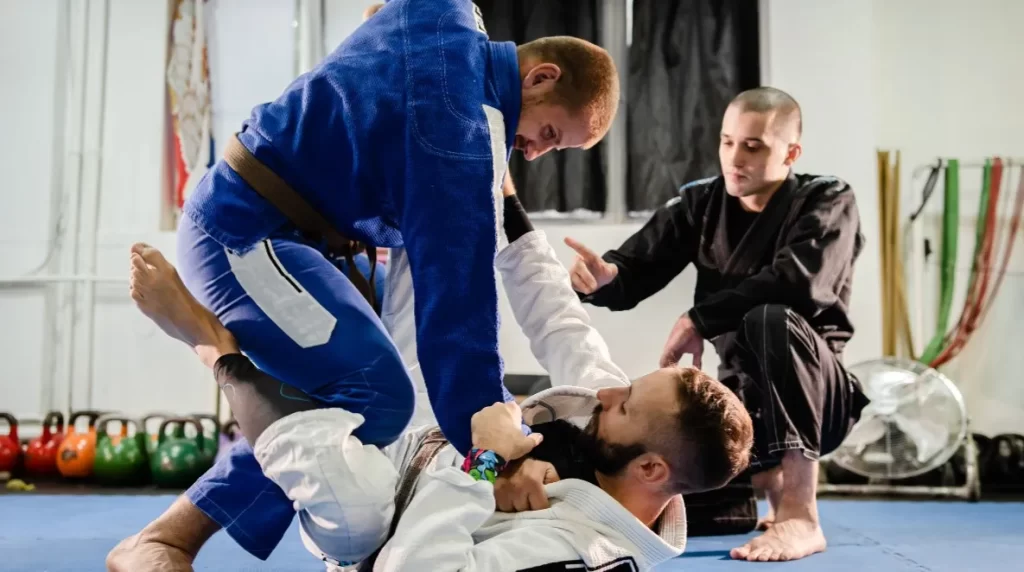
Grappling Emphasis: BJJ focuses heavily on ground-based grappling and submission techniques. It teaches you how to control and submit opponents from various positions.
Size and Strength: BJJ is known for its effectiveness in allowing smaller individuals to defend themselves against larger and stronger opponents through leverage, technique, and positional control.
Few martial arts have the ability that BJJ does, to overcome big size disadvantages in combat.
Realistic Scenarios: BJJ training often involves sparring (rolling), which simulates real-life confrontations and helps you practice techniques under pressure.
Self-Control: BJJ emphasizes the importance of patience and control, which can be advantageous in avoiding unnecessary escalation and violence.
Every position taught is about control, leading to submission.
Ground Defense: BJJ is particularly useful if a self-defense situation ends up on the ground, where traditional striking arts have limitations.
Martial arts like BJJ would give an untrained opponent virtually no chance once it hits the ground. You will be able to lock up a submission effortlessly.
Factors to Consider
Personal Preference: Consider which martial arts resonate with you more and fit your goals for training. If you don’t want to be a world beater and just get more enjoyment training karate than other things, then why not continue with the sport?
Realism: Both BJJ and Karate can be adapted to realistic self-defense scenarios, but BJJ will eat it alive in this aspect. If that’s important to you, don’t train karate.
Complementary Skills: Combining both arts can provide a more well-rounded self-defense skill set. This is one aspect karate can be useful for, giving unorthodox looks to other strikers.
Which is Better for Street Fights: Karate vs Jiu Jitsu

If you encounter two or more enemies Karate is probably a better martial art to deal with overcoming multiple attackers, but I don’t see that fairing well either, to be honest.
BJJ is more effective when it involves a battle between two people. Not many people know how to grapple, and BJJ is considered one of the best grappling martial arts in existence right now.
If a BJJ practitioner and a random street thug get into an altercation, I would put my money on the Jiu-Jitsu practitioner every time.
BJJ practitioners have a better chance of defending themselves, and being successful compared to a karate guy.
There are numerous videos online showing a karate guy getting beaten to a pulp by a BJJ practitioner.
Not all martial arts are created equal.
Which One Is Harder And Takes More Time To Learn?
Brazilian Jiu- Jitsu is a much harder martial art to learn, and mastering the skill can take as long as 12 years of consistent training. The black belt rank in BJJ is incredibly rare, and most BJJ practitioners will not reach the top of the mountain.
Karate, on the other hand, hands out belts based on things like attendance, and the techniques you are able to show to your master. This is a joke to me.
You aren’t physically testing your martial arts skills against trained fighters with resistance.
BJJ on the other hand, you have to spa, you have to fight against other trained fighters, and there is no way around it. You will not get graded if you don’t spa in Jiu-Jitsu.
If all I had to do to achieve a black belt in BJJ was show techniques against a fully willing opponent, everyone would have their black belts… Being able to execute techniques against your opponent’s will is the real skill.
BJJ vs. Karate For MMA
MMA gyms rarely train karate. They have kickboxing, Muay Thai, Brazilian Jiu-Jitsu, and wrestling.
Stephen Thompson, is one example of a fighter in the UFC whose base fighting style is karate.
But Stephen Thompson doesn’t employ traditional karate techniques when he fights, he was smart enough to acknowledge it’s limitations, and uses mostly kickboxing, and Muay Thai techniques within his striking arsenal instead.
There is a reason you still see Brazilian Jiu-Jitsu employed in nearly every fight in MMA today, and that’s because it works, and is very effective.
Karate on the other hand doesn’t even get a look in and that’s because it is one of the worst striking martial arts you could learn. MMA fighters will train striking arts such as boxing, Muay Thai, or kickboxing as they are more in depth, technical and effective for self-defense.
BJJ Belt ranking system

”Gi” BJJ will have you working through a belt system that has 5 belts, they also offer a ”No Gi” style of grappling that doesn’t have belts attached to it.
”No Gi” is just wearing different clothing and doesn’t allow clothing grips to be used on opponents.
The average time spend at each belt is below:
White belt: 1- 2 years
Blue Belt: 2- 3 years
Purple Belt: 5-6 years
Brown Belt: 6-8 years
Black belt: 10 years +
Karate Styles & belt ranking system
Here are the top 5 popular Karate styles:
Shotokan: This one’s super common and known for its strong punches and kicks. They’re all about looking tough and steady stances.
Kyokushin: These guys are like the tough guys of karate. They love full-on fighting and getting super fit, so it’s no walk in the park.
Goju-Ryu: They’re all about a mix of hard and soft moves. Imagine circular motions and fighting up close. It’s like a cool combo.
Wado-Ryu: These folks borrow stuff from jujitsu, and they’re all about moving slick and dodging hits. Quick footwork is their thing.
Shito-Ryu: These guys are the mixers. They’re into both soft and hard moves, and they flow real smooth in their techniques.
Belt rankings:
The way karate belts work can be a bit different depending on the style you’re talking about. But usually, there are around eight different colored belts in the system:
White, Yellow, Orange, Green, Blue, Purple, Red, Brown
As you get better, you switch from one color to the next.
Frequently asked questions
Are Karate and BJJ belts the same?
Karate has about 7 – 10 belt ranks to work through depending on the school and system. Some karate schools here in Australia hand out black belts like they are candy. 6 months and you could have one.
BJJ has 5 belts to work through, but you will spend a long time at each belt rank before progressing to the next level.
How many years does it take to get a black belt in karate?
Getting a black belt in karate generally takes 3 years at most, but this depends on the instructor and style of karate being pushed.
Can Karate beat kung fu?
Karate can beat kung fu, but it depends on the skills of the practitioner like most martial arts.
Can a karate guy beat a boxer?
It can happen, but it’s unlikely. There is always many variables at play when one martial art comes up against another, but a boxer stands a better chance due to it being more practical for self defense.
In conclusion:
The comparison between Karate and Jiu-Jitsu reveals distinct differences in approach and effectiveness.
Karate, once a popular choice, has faced a decline in relevance due to its limited focus on striking techniques and lack of full-contact sparring.
Its choreographed sequences and emphasis on quick movements are seen as outdated and less effective in today’s combat landscape.
Karate’s inability to prepare people for full-contact fights and its dependence on compliant partners for technique execution raises concerns about its practicality.
Brazilian Jiu-Jitsu shines with its grappling-centered approach, forcing opponents into submission through technique, leverage, and control.
BJJ’s emphasis on ground fighting skills and its effectiveness against larger opponents make it a formidable choice.
With its focus on sparring, or “rolling,” practitioners train under pressure, developing the skills needed to dominate opponents and control situations.
BJJ’s performance in the early days of the UFC highlighted its dominance, showcasing its real-world effectiveness.
While Karate may retain value for certain individuals and contexts, Brazilian Jiu-Jitsu stands as a comprehensive and practical discipline, proven through its history in real-world combat and its adaptability to various scenarios.
Karate and Jiu-Jitsu both have value, but with the emphasis on sparring in BJJ, realistic training, and effectiveness against a range of opponents, Brazilian Jiu-Jitsu is the clear winner.
In the battle between the two, it provides practitioners with the tools they need to excel in self-defense and combat sports.
